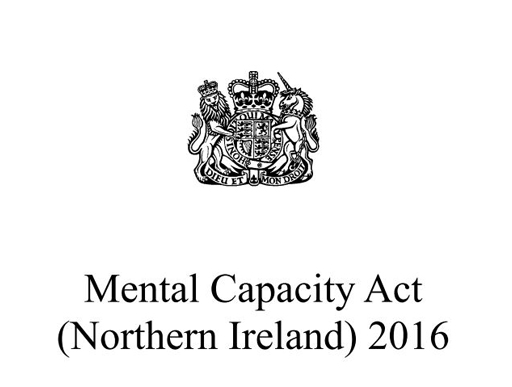2.3 Mental capacity in Northern Ireland
Mental health legislation in Northern Ireland is the most recent to be published.

The principles of the Mental Capacity Act (Northern Ireland) 2016 are set out in Box 3.
Box 3 Principles of the Mental Capacity Act (Northern Ireland) 2016
Principles: capacity
1.—(1) The principles in subsections (2) to (5) must be complied with where for any purpose of this Act a determination falls to be made of whether a person who is 16 or over lacks capacity in relation to a matter.
(2) The person is not to be treated as lacking that capacity unless it is established that the person lacks capacity in relation to the matter within the meaning given by section 3.
(3) Whether the person is, or is not, able to make a decision for himself or herself about the matter—
(a) is to be determined solely by reference to whether the person is or is not able to do the things mentioned in section 4(1)(a) to (d); and
(b) accordingly, is not to be determined merely on the basis of any condition that the person has, or any other characteristic of the person, which might lead others to make unjustified assumptions about his or her ability to make a decision.
(4) The person is not to be treated as unable to make a decision for himself or herself about the matter unless all practicable help and support to enable the person to make a decision about the matter have been given without success (see section 5).
(5) The person is not to be treated as unable to make a decision for himself or herself about the matter merely because the person makes an unwise decision.
(6) Nothing in subsections (1) to (5) removes any obligation that a person may be under in a particular situation to take steps to establish whether another person has capacity in relation to a matter.
Principle: best interests
2.—(1) The principle in subsection (2) applies where, under this Act—
(a) an act is done for or on behalf of a person who is 16 or over and lacks capacity in relation to whether the act should be done; or
(b) a decision is made for or on behalf of a person who is 16 or over and lacks capacity to make the decision.
(2) The act must be done, or the decision must be made, in the person’s best interests.
You will be exploring assessment of mental capacity in more detail in Week 4 but in this section you have also learned that in establishing whether someone lacks capacity, certain principles must be followed. Included amongst these are the following.
- All practicable help and support be provided for decision-making
- Making an unwise decision does not mean a person lacks capacity.
- No-one can be deemed to lack capacity on the basis of age, appearance, their condition or assumptions about behaviour.
- If a person is found to lack capacity to make a particular decision, even with support, the substitute decision maker needs to determine what is in the individual’s best interests.
So, how are these principles applied in real life?
